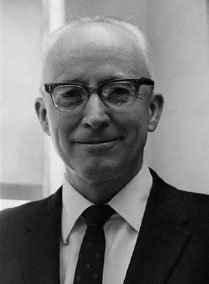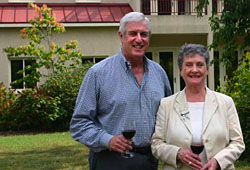A Lasting Tribute
Trustee Establishes a Graduate Fellowship in His Advisor's Memory
In honor of the faculty mentor who guided him toward a Ph.D. in chemistry 45 years ago, university trustee Antony E. Champ has endowed a graduate fellowship fund in the College of Arts and Sciences.
The fund will be named for J. Reid Shelton, a leading researcher in rubber chemistry, who spent his entire career at Case Western Reserve University and its predecessor institutions. At the time of his death at age 96, in December 2007, Shelton was emeritus professor of chemistry and macromolecular science.
"He was a lovely man to work with, a really delightful person," Champ says. "He was a consultant for industry, so I think he taught me some practical aspects of business. He knew what industry looks for: results. Dr. Shelton also let you find your own way. He was always there for guidance, but he allowed you to take your thesis work wherever you wanted it to go—within bounds."
Shelton made several of his major scientific contributions during World War II. When the United States lost access to natural rubber supplies from Southeast Asia, Shelton and other chemists were recruited by government and industry to improve the durability and flexibility of synthetic rubber, which had been plagued by "instability problems." Long after the war, he and his graduate students continued to investigate chemical reactions in rubber and related polymers. Recognizing his contributions, the American Chemical Society's Rubber Division awarded Shelton the Charles Goodyear Medal, its highest technical honor, in 1983.
His early life and career didn't follow a predictable course. Shelton grew up in an Iowa town whose one high school was too small to employ a chemistry teacher; but his English teacher gave him a book on chemistry that inspired him, and he later won a prize for a paper about the industrial use of corn cobs. He earned his undergraduate and graduate degrees at the State University of Iowa, where rubber chemistry didn't appear among the course offerings. And he landed his first job, at Case School of Applied Science, without even knowing he was a candidate; his advisor had applied on his behalf. Which is why, when Tony Champ enrolled as a graduate student in organic chemistry in 1959, Shelton was on hand to serve as his advisor.
Champ decided to come here after receiving a Goodyear assistantship, which paid him to do research that was applicable to his thesis. "It was a very good deal for me," he says, and yet his graduate school years were a "fairly austere time." As he puts it, he and his wife Edie "had absolutely no money except for what I was getting from the assistantship." Champ rode a bicycle between their Cleveland Heights apartment and his chemistry lab. And on the rare occasions when they went to hear George Szell conduct the Cleveland Orchestra, they sat "way in the upstairs, in the upper ranks of Severance Hall. That was delightful."
With his advisor's approval, Champ bypassed the master's degree and finished his Ph.D. in four years. "I think Dr. Shelton took pity on my wife and myself," Champ says, a hint of exaggeration in his voice. "We were newly married when we got here, and by the time we left, we had 2 1/2 kids. He got me out in record time because he was worried about us."
After he graduated, Champ was hired by Celanese Corporation, where he specialized in synthetic fibers. Over the next 25 years, he made his way from the company's central research and applied science labs to positions as manufacturing supervisor, vice president of marketing, and finally vice president for specialty chemicals. In 1987, after arranging a leveraged buyout of some of Celanese's assets, Champ and other investors formed Fiber Industries, which soon became the third-largest U.S. producer of polyester fiber. Champ served as the company's president and CEO until it was sold to Wellman Industries in 1989.
That phase of Champ's career taught him lessons in entrepreneurship that he soon applied to a very different setting. He and his wife are now the proprietors of White Hall Vineyards, a working winery in Charlottesville, Virginia.
Although he relies on the expertise of a professional winemaker, Champ likes to keep up with the latest in viticultural research. "It keeps the winemaker from snowing me," he explains with a smile. "I can outdazzle him with chemistry."
Attracting the Best
Champ says that the idea of dedicating his gift to graduate fellowships came directly from Dean Cyrus C. Taylor. The College's new strategic plan calls for a "renaissance in graduate education," and Taylor says that obtaining additional resources for stipends and fellowships is essential to achieving this goal.
"Whether it be in the natural sciences, social sciences, arts, or humanities, graduate students are really at the core of our intellectual activity and productivity, both in research and in teaching," Taylor says. "The corollary to this is that competitiveness in everything we do turns on the viability and vitality of our graduate programs. Just as we need to hire the best faculty in order to be the institution we want to be, we also need to attract the best graduate students."
The agreement establishing the fellowship fund states that it shall "stand and serve as a lasting tribute from the graduate students of J. Reid Shelton, Ph.D., for his mentoring, support, and friendship." Champ, who has been in touch with several of his fellow students over the years, hopes they will join him in this tribute. "I'll be glad to make some phone calls," he says.

J. Reid Shelton, a member of the chemistry faculty for 41 years, received the Goodyear medal in 1983.
Photo courtesy of University Archives
 Tony and Edie Champ enjoy the fruits of their labors at White Hall Vineyards in Charlottesville, Virginia.
Tony and Edie Champ enjoy the fruits of their labors at White Hall Vineyards in Charlottesville, Virginia.
